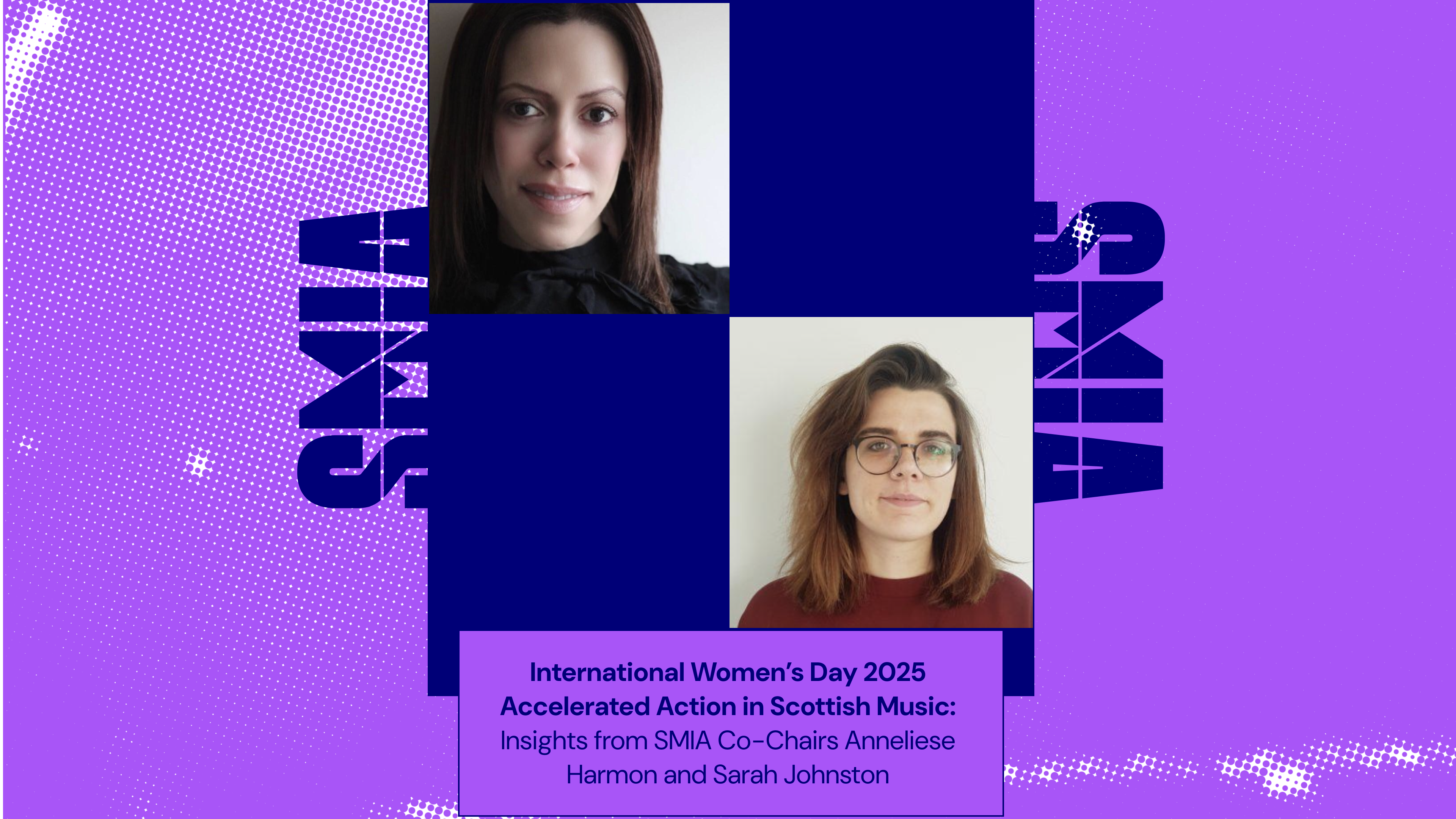International Women’s Day celebrates the achievements of women across every sector, shining a light on their impact and encouraging further progress. This year’s theme, ‘accelerated action’, urges us to work harder, and move faster and more effectively towards equality.
To explore what this means in the Scottish music industry, we spoke to our two Co-Chairs of the Scottish Music Industry Association: Anneliese Harmon and Sarah Johnston.
Anneliese Harmon, Non-Executive Director (Co-Chair)
With over 25 years of experience in music management, international marketing, and business development, Anneliese has helped shape global strategies for major and independent artists alike. She is a key figure in UK music industry groups, contributing insights on digital burnout, mental health, tech and AI, equality, and diversity.
Sarah Johnston, Non-Executive Director (Co-Chair)
Sarah has spent more than a decade in music distribution and licensing. During her various roles, most recently as Director of Client Relations EMEA at FUGA. She has built extensive knowledge across the independent music landscape and regularly represents labels, distributors, DSPs, and trade bodies on key industry issues.
1. How do you interpret this year’s theme of ‘accelerated action’ in the context of women in music, and why is it important now?
Anneliese: I interpret this year’s theme of “accelerated action” as both a proud recognition of how far women in music have come and a call to use that momentum to push even further. While we’ve seen significant progress, with many women now included and welcomed into spaces where we were once excluded, I see it as a statement that we must not take anything for granted or stop advocating for more.
It’s important now, as the spotlight on our achievements is a powerful tool—it allows us to amplify our voices and create more meaningful change. Now is the perfect time to harness that power and take more action, ensuring that our progress not only continues but accelerates.
2. From your career so far, can you share an example of a moment or project where you felt real progress was being made for women in the industry?
Sarah: I can remember the 2014 launch of the Music Week Women in Music Awards and the cynicism I heard from some people. Now just over a decade on, the awards are bigger and better than ever.
I have had the pleasure of working with both founders of the awards and they are truly inspirational. They continue to champion women and their work and they do it loud enough that it cannot be ignored.
3. What are the biggest barriers you still see for women in music, and how can ‘accelerated action’ help break them down?
Anneliese:
The biggest barriers I see for women in the music industry are the recognized, but not closed yet, gender pay gap, limited flexibility for those who choose to start families, and an often unspoken issue I’ll call the unofficial “age out.” While it’s common to see older men with long careers still thriving in the industry, older women often face a different reality.
This is something I’d love to see change, as age brings experience, wisdom, and mastery—qualities that can benefit the industry immensely. Accelerated action keeps the pressure on. It’s also crucial for the next generation to see that action can cause change, and to know that there’s a long-term, valued and fair place for them in the music industry as well.
4. Is there any practical advice you would give to women starting out in music who want to make a strong impact?
Sarah: Champion yourself, that’s a given, and champion those around you as well. To make a strong impact, you need to acknowledge that equality can only occur when everyone feels seen and heard. Oh – and always be yourself.
5. With your involvement across trade organisations and working groups, what immediate steps can music businesses take to speed up equality and diversity?
Anneliese: I’ve learned that the most immediate steps businesses can take to accelerate equity is by making it a priority within both their company policy and culture. They should actively seek out and partner with organisations dedicated to equality, diversity and elevating women in music, tapping into their expertise and support.
But most importantly, they must make a conscious effort to take real action and hold themselves accountable—from the top down. It will be worth it. A culture where everyone feels fairly treated and valued is one that will always thrive.
6. Looking to the future, what are your hopes for women in the music sector, and how do we maintain the momentum of accelerated action?
Sarah: We can’t dismantle generations of institutionalised disparity in one fatal swoop, but we can continue to be vocal and demand change and the momentum for that comes from celebrating and acknowledging what has already been achieved.
In the UK the groundwork has already been laid with things such as Gender Pay Gap Reporting, Music Weeks Women in Music Awards and Sony’s roll out of policies for equal parental leave, pregnancy loss, domestic abuse and menopause, but we need to remain vocal on the disparity women in our sector are faced with daily and hold those at the top accountable.
Anneliese and Sarah’s experiences show that while there is clear progress—through initiatives such as music awards spotlighting women, formal gender pay gap reporting, and evolving parental leave policies – barriers remain. From the “unofficial age out” to persistent gaps in representation and pay, each concern they raise demonstrates the need for faster, more intentional, and more inclusive industry-wide action.
As we mark International Women’s Day, let’s build on the momentum by championing new talent, driving diversity in leadership and continuing the conversation on how to accelerate equality for everyone.
If you’re interested in helping shape the future of the SMIA and Scotland’s music industry, we’re currently seeking passionate and skilled individuals to join Sarah and Anneliese on our Company Board as Non-Executive Directors.
